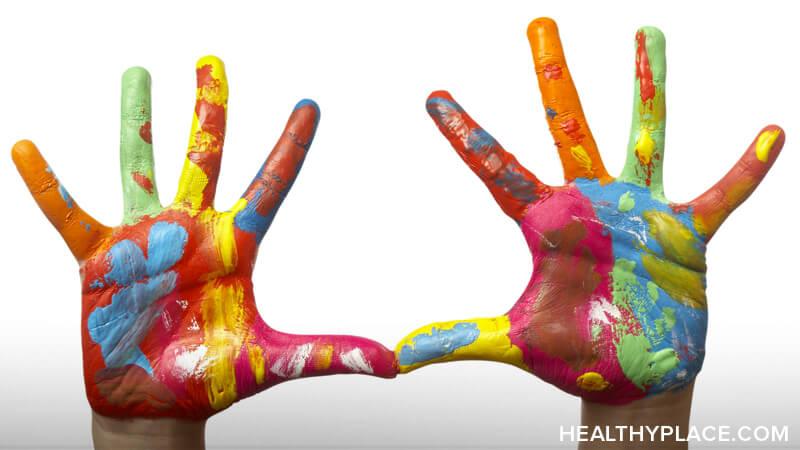Creativity Is a Coping Skill for Binge Eating Recovery

Before I recovered from binge eating disorder (BED), I would not have identified myself as a creative person. My identity at the time revolved around sports, athleticism, and my appearance as a student-athlete. This image I held onto kept me in an awful cycle of restricting and binge eating. I felt like I had to keep up an athletic appearance. After I graduated high school, I knew I'd outgrown my old identity, but I did not know where to begin outside of that structured model.
My first creative leap came when I signed up for a creative writing class in college. I remember the first day of class our professor asked us all to find ourselves a notebook. I bought my first journal since middle school that day. It was bright daffodil yellow, and I filled that notebook front to back, feeling a blooming excitement about expressing my thoughts and releasing them onto the page. I felt awake and inspired.
Since then, I've kept a notebook. I don't write in it every day, but I reach for it when I need to express something I don't feel I can tell anyone else. Creative writing helps support my BED recovery because it helps me stay in touch with my interior world.
How Creative Pursuits Help with Binge Eating Disorder Recovery
When you make something that didn't exist before you created it, be it paint, photos, words, music notes, or craft supplies, you are reinserting yourself back into the world. You can be a part of the world and have an impact on it with your unique creative touch.
When you find something creative you enjoy doing, it helps give you a sense of identity that has nothing to do with your appearance. Your creativity can bring color to blank walls, presents to make other people feel special, and the satisfaction of knowing you tried something out you've always wanted to.
Tips for Being a Creative Person in BED Recovery
For the past couple of years, I've leaned into creativity as a way to build confidence and self-esteem. I believe when we try out an idea that we've seen or imagined in our minds, regardless of how the project ends up going, it gives us a sense of self-determination.
- Invest in your creative ideas -- For a long time, I resisted buying myself creative materials like paints and brushes. I worried I would not use them. I recommend you go for it and get some materials that fit your budget so you can start a project or practice a new art form now instead of later. This is a kind gesture for yourself, so don't feel guilty. You can also find creative materials at thrift stores for cheap.
- Make bad art and use up your materials -- One thing I tell myself whenever I start a project is: "Let's make bad art and have some fun." This helps me remember that the purpose of creativity is to just explore. Seeking perfection will prevent you from practicing. Also, don't be afraid to use up your art materials. They're there to be used for practice, not kept on the shelf for years.
- When in doubt, make gifts for others -- It is difficult to motivate creativity sometimes. For me, I am much more motivated to sit down for a project if I'm making it for someone I care about. For example, you could paint a card for someone instead of just painting for practice.
I hope these tips help give you a spark of inspiration to start getting creative. There are so many gifts, art projects and discoveries to be made. I hope you find one small opportunity to be creative this week and see what happens when you try it out with permission to be bad at it. Let me know how it goes!
In this video, I chat about how to integrate more creativity into your daily routine to help give you a boost of self-esteem during your recovery from an eating disorder.
APA Reference
Parten, E.
(2022, May 3). Creativity Is a Coping Skill for Binge Eating Recovery, HealthyPlace. Retrieved
on 2025, May 15 from https://www.healthyplace.com/blogs/bingeeatingrecovery/2022/5/creativity-is-a-coping-skill-for-binge-eating-recovery
